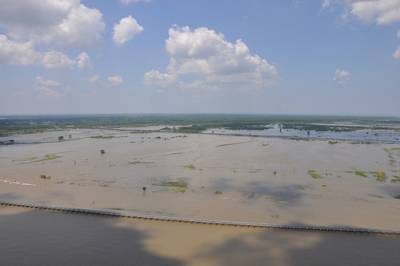Mississippi River Could Close on Monday
Swollen by weeks of heavy rain and snowmelt, the Mississippi River has been breaking high-water records that have stood since the 1920s and 1930s; it is projected to crest at Vicksburg, Mississippi, on 19 May and break the mark set there during the historic Great Flood of 1927; the crest is expected to reach New Orleans on 23 May; officials with the Port of New Orleans said the Coast Guard may close the river to ships as early as Monday, halting traffic on one of the world's busiest commercial waterways; barges headed south from the U.S. heartland to the Port of South Louisiana at Reserve, upriver from New Orleans, would be unable to reach grain elevators; massive ships that carry U.S. corn, soybeans, and other crops out of the country would be unable to move.
The swelling waters of the Mississippi River impose tough decisions of state and federal officials. The historically high levels of water in the river will cause flooding along sections of the river – but by strategically breaching levees in this section or that, officials can cause more water to flood, say, a stretch of agricultural land in Tennessee in order to reduce the risk of flooding urban neighborhoods in Baton Rouge or New Orleans. Or they can decide to allow the water to flow south, spare the fields, and allow cities to be flooded. Fox News reports that swollen by weeks of heavy rain and snowmelt, the Mississippi River has been breaking high-water records that have stood since the 1920s and 1930s. It is projected to crest at Vicksburg, Mississippi, on 19 May and break the mark set there during the historic Great Flood of 1927. The crest is expected to reach New Orleans on 23 May.
- Officials with the Port of New Orleans said the Coast Guard could close the river to ships as early as Monday, halting traffic on one of the world’s busiest commercial waterways.
- After flooding low-lying neighborhoods in Memphis, Tennessee, earlier this week, the rising water is now flooding farms and small waterfront communities in Mississippi, Louisiana, and Arkansas.
- The Corps of Engineers is considering whether to open the Morganza spillway, which would flood thousands of homes and acres of farmland along a 100-mile stretch in Louisiana but relieve the pressure off levees and help to protect Baton Rouge, New Orleans, and the oil refineries in between. A decision is expected in the next several days.
- Fox New quotes Chris Bonura, a spokesman for the Port of New Orleans, to say the Coast Guard plans to close a 190-mile stretch of river from Baton Rouge to the Gulf of Mexico when the water reaches the 18-foot level at a gauge in Carrollton, which could happen by Monday.
- The mouth of the Mississippi would become crowded with ships with nowhere else to go, though some might be diverted to other ports.
- Barges headed south from the U.S. heartland to the Port of South Louisiana at Reserve, upriver from New Orleans, would be unable to reach grain elevators.
- Massive ships that carry U.S. corn, soybeans, and other crops out of the country would be unable to move. Shipments of Venezuelan heavy crude oil that come in by tanker to a refinery in Chalmette would be locked out of the river, though most refineries on the river are fed by pipelines.












